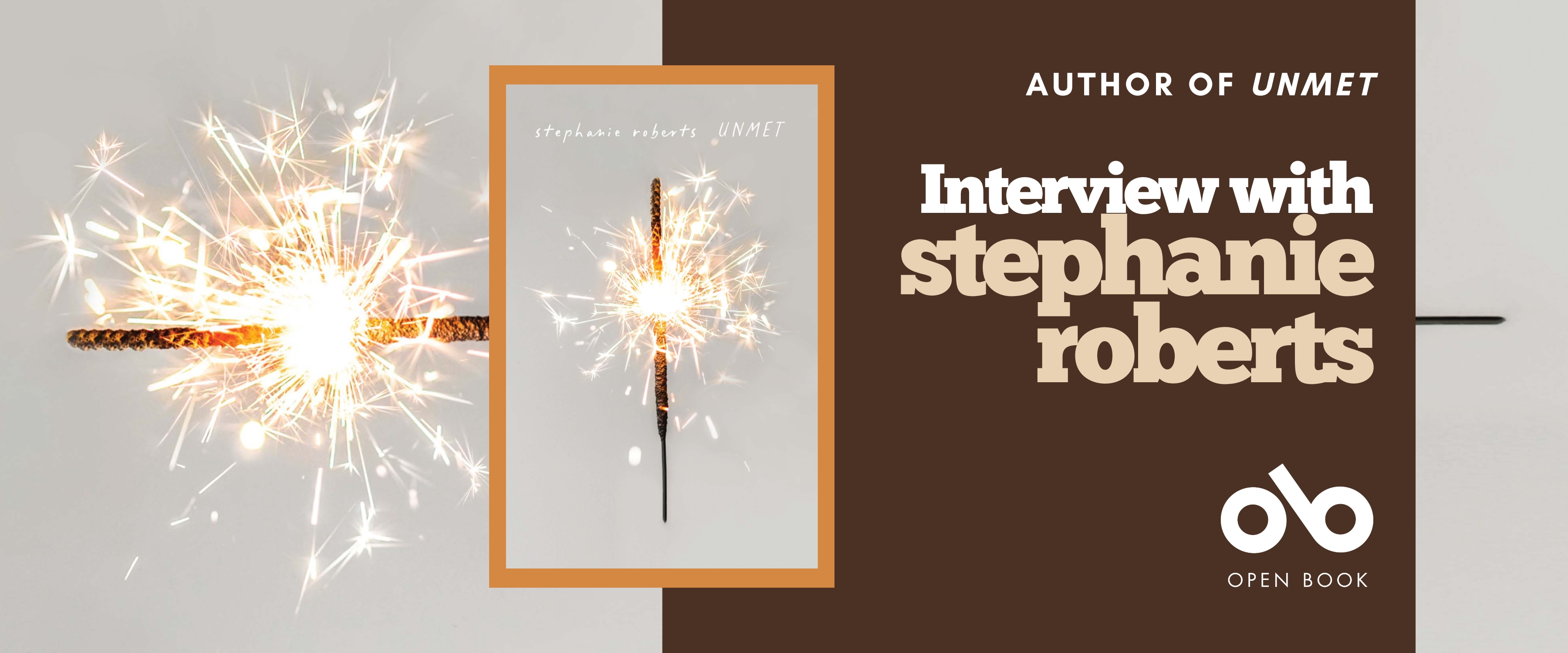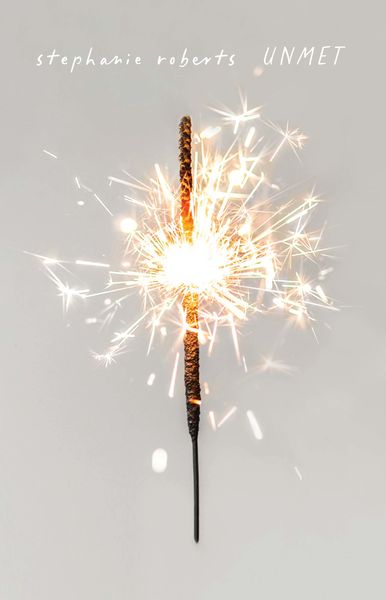Internationally-Acclaimed Poet stephanie roberts Returns with the Breathtaking Collection, UNMET
On the heels of critical praise for her first poetry collection, stephanie roberts returns with another complex and stunning work that looks at both the seen and unseen, and explores social issues through lyric and line in a truly singular way.
In UNMET (Biblioasis), the author draws on a wide range of poetics while bringing her voice to bear on the violence and danger of our time, all with an eye to the past and a sense of hope for the future. As these poems lean on imagination and pull at the threads of reality, they share profound truths about the world we are living in.
We're thrilled to feature this title on Open Book, and to share this Poets in Profile interview with the author!
Open Book:
What has been your most unlikely source of inspiration?
stephanie roberts:
I was visiting friends in Burlington who watch TV as a family. I wandered into the living room one evening and there they all were crowded around the screen watching America's Got Talent. They are a big musical family so they love to hear the singers. Instead of a singer, the next performer was Stevie Starr, a man aptly called, the Human Regurgitator which is exactly what you think it is. With an intense gaze and teeth viciously abused by stomach acid, he was enthusiastically gulping down and then regurgitating all types of objects. And, he wouldn't just swallow and regurgitate these objects. He would manipulate them in the dextrous engine of his gut parting his cropped sequinned blazer to give the audience an unobstructed view of his bare abdomen's undulations. He'd swallow first a screw then a nut, or a lock then a key, then he'd make these various combinations of objects reappear conjoined. Something of this spectacle of the extremes of the body, the thirst for novelty, and whatever it must be that drives Mr. Starr, stirred contemplations in me about the nature of belief and romantic love. At the time people behaving badly was a too common expression and in the poem, inspired by these shenanigans, I played off of that phrase. In about twenty minutes, sitting on the upper level of a double-decker Megabus travelling from Toronto to Montreal, I wrote "People Believing Badly," in rushes from the river disappointment. Rarely do I complete a work as quickly as I wrote that and it has since been reprinted three times and translated into French and Farsi.
OB:
What do you do with a poem that just isn't working?
SR:
I have a fifty-five page document I call "Unpublished and Uncollected" and if all else fails I gently deposit the poem there to convalesce. But before that drastic measure, I think the poet should read the poem aloud, listen to someone else read it (I got this from Jane Munro), or completely change the form of the poem. I will sometimes convert a poem to a sonnet because structure can foment creative solutions. In poems where I suspect I'm having a clarity issue, I have converted the poem to prose then back to verse. When I'm editing work, I will sometimes ask a writer to make the poem twice as long and from this iteration the poet can sculpt away the non-poetic least essential parts and, hopefully, when they're done it's the statue of David. Throw out the opening stanza. Sometimes the idea that draws us into the poem acts like a kind of prison. I think poets who only title their finished poems might agree. Throw out the final stanza. I used to listen to a preacher whom I thought was a gifted speaker except every one of his sermons was twenty minutes too long. Unfortunately, he was a little in love with his own voice. Likewise that line that you love that you just can't seem to make fit, cut it. If all the above fails your unpublished uncollected document awaits. Often what a poem needs more than anything is the clear perspective only a few months or years can give.
OB:
What's more important in your opinion: the way a poem opens or the way it ends?
SR:
Both are important but the way a poem opens is more important. Paul Muldoon said something to the effect that the title is an opportunity to direct the reader and we ought not leave poems untitled. He held up James Wright as an example to us. If I think of the title as the home address, the open is your step through the front door. No matter what wondrous things may or may not happen within you still need to pass through the door. It sets the stage. Practically, and obviously (forgive me), outside of an experimental form you have to proceed through the open to even get to the end.
Your CanLit News
Subscribe to Open Book’s newsletter to get local book events, literary content, writing tips, and more in your inbox
OB:
What was the last book of poetry you read that really knocked your socks off?
SR:
The Bees Make Money in the Lion by Asian-American poet Lo Kwa Mei-en. The work of that collection tore my head apart. It is a towering invention of startling ambition and diabolically acrobatic word play. Substantively, this balances on content that critiques colonialism, contains mesmerizing leitmotifs, with a soupçon of religion. The title plays with the event in the Book of Judges where Samson finds honey in the carcass of a lion he'd killed previously. The switch of honey to money is the bow that introduces itself. This poetry is maximalist and it isn't content with little swings. Instead, the poet tasks herself with complicated strictures and playgrounds of extravagant sound. Assonance, consonance, slant rhyme, internal rhyme, end rhyme, and abcdary it's all in there. Deliciously decadently so. To enter into its pages is to sit down to an elegant evening of dinner and drinks with your most charming and glamorous friend.
OB:
How would you describe the poetry community in Canada? What strengths and weaknesses do you observe within the community?
SR:
I'm a Black anglophone woman in a French town in Quebec about forty-five minutes outside of Montreal. I came to writing poetry later in life and my education is in business. All that preamble is to say I don't feel like I know the poetry community very well although I have made dear friends and met lovely poets. I don't feel qualified to speak authoritatively about a subject which covers so vast a geography. My first collection came out during the pandemic which precluded travel in support of that work, but with the release of UNMET (Biblioasis, April 2025) I look forward to experiencing the poetry community coast to coast. What I will say about my experience is that I think the Quebec Writers' Federation and Lori Schubert have done an amazing job and the opportunities and resources they've provided over the years has helped me to become the writer that I am. The poetry community in Ottawa has been very supportive. I know very little about the west and have had little experience in Toronto outside of some virtual events. Overwhelmingly, my experience has been one of generosity and action behind the intention to have a literary community that reflects the faces of all Canadians not just white, heteronormative, middle-aged males.
OB:
What is the best thing about being a poet…and what is the worst?
SR:
The best thing about being a poet is that a lot of my friends are poets! The worst thing about being a poet is the struggle to be present. It's a curse in our culture, and I think it's even more difficult for poets to be present without experiencing the moment as something to be mined for future material.
____________________________________________
stephanie roberts is the author of rushes from the river disappointment, a Quebec Writers’ Federation finalist for the A.M. Klein Prize for Poetry, the winner of The Sixty-Four: Best Poets of 2018, a recipient of the Sage Hill Writing award for Black Excellence, and a Canada Council of the Arts grantee. Her work has been critically praised and featured in well over one hundred periodicals and anthologies, in print and online, throughout Canada, the US, and Europe. She is a citizen of Canada, Panama, and the US, and has lived most of her life in Quebec.







